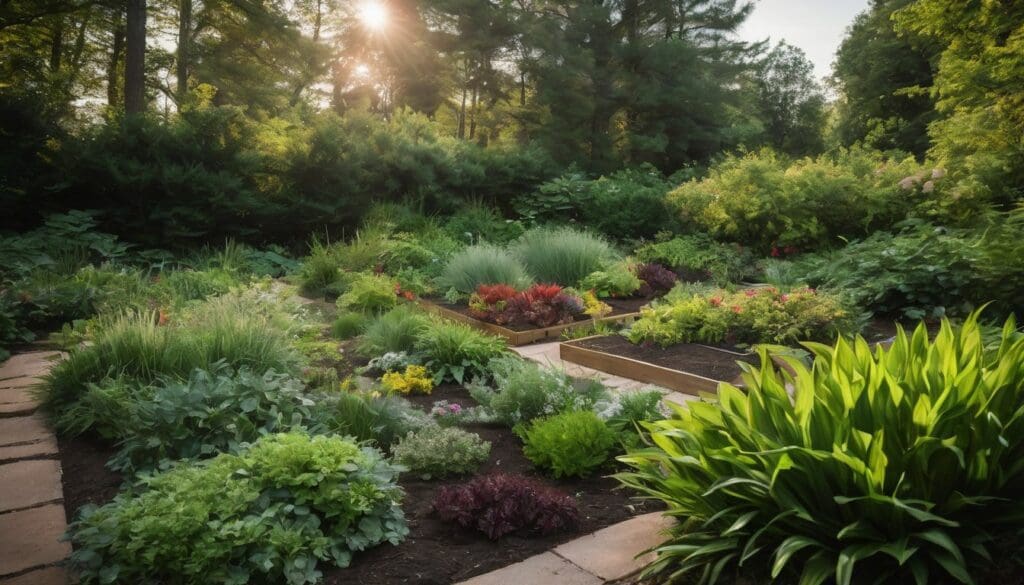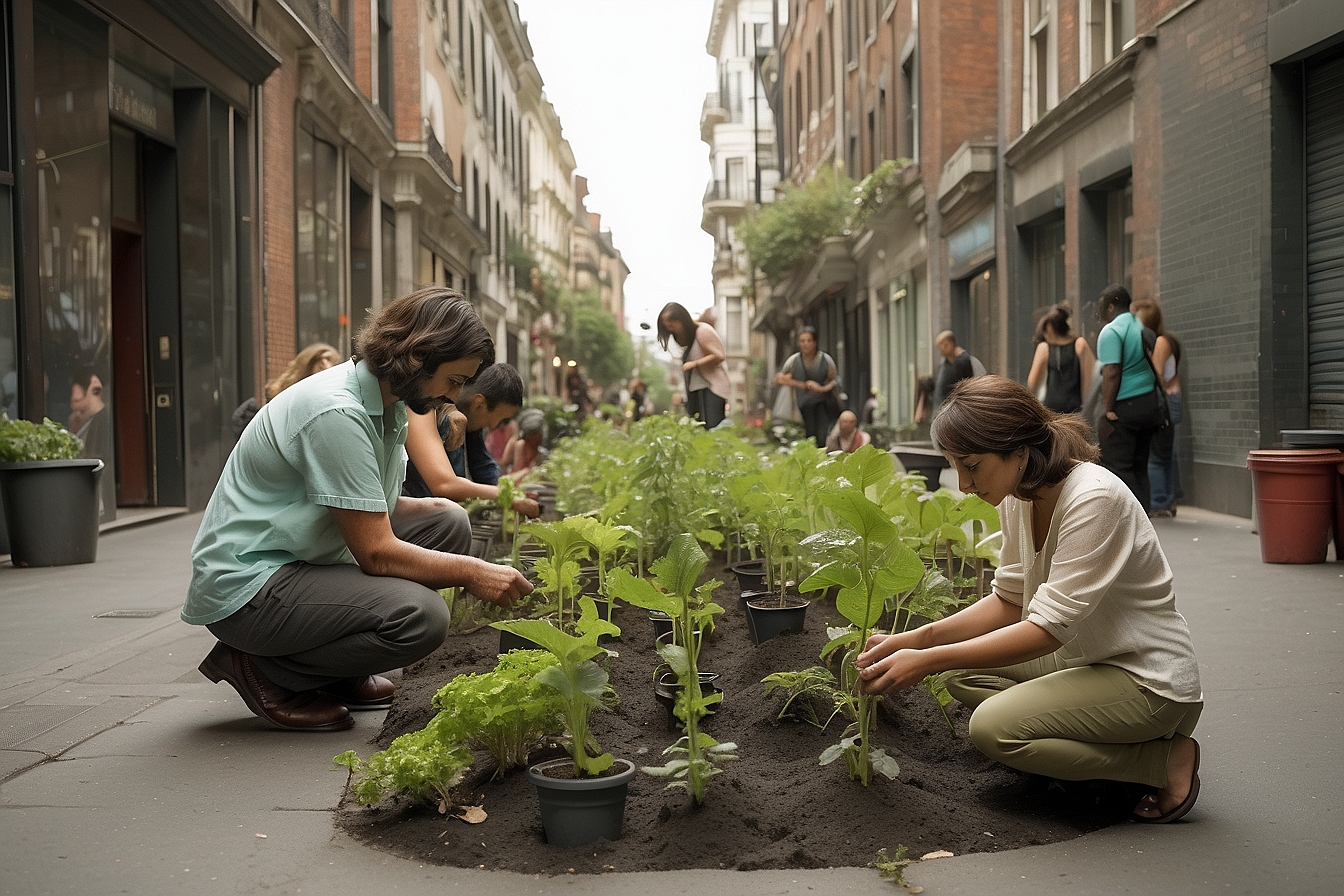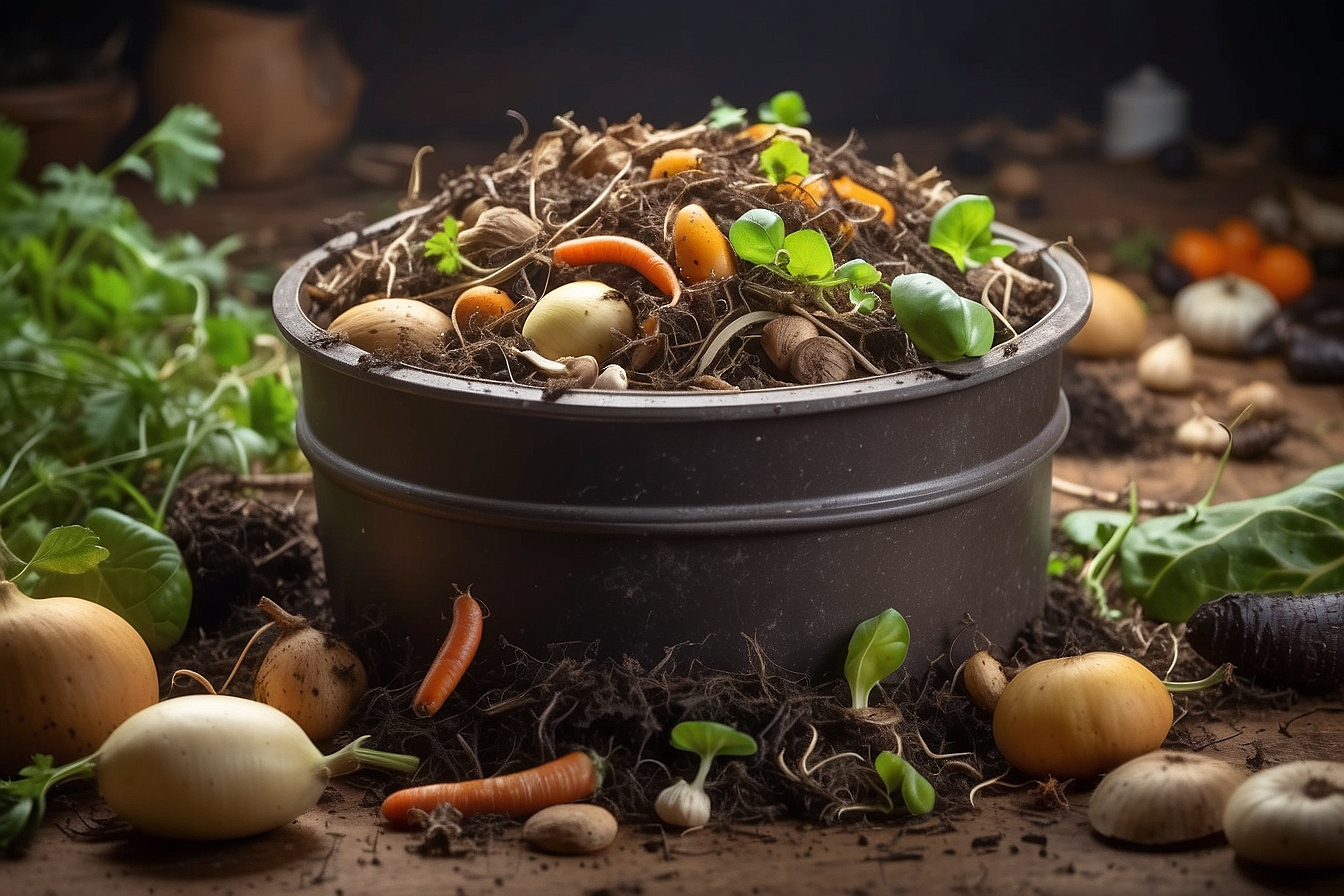Are you struggling to maintain a healthy garden with thriving plants? We’ve been there too! Did you know that using mulch in your gardening can make a world of difference? In this article, we’ll explore the many benefits of mulching and how it can help solve common gardening problems. Get ready to discover the secret to a lush and vibrant garden!
Key Takeaways
- Mulch acts as a crucial weed barrier in gardens by blocking sunlight that weeds need to grow, allowing gardeners to use less chemicals and do less manual weeding.
- It helps retain soil moisture by reducing evaporation, meaning plants stay hydrated for longer and require less watering – this contributes to water conservation.
- Using mulch is beneficial for regulating soil temperature; it keeps the ground cool during hot spells in summer and insulates plant roots against cold in winter.
- Organic mulches like compost or straw add nutrients back into the soil as they decompose, improving fertility and encouraging earthworm activity which benefits overall soil health.
- Mulching also aids in preventing soil erosion by protecting against the impact of rain and wind, helping conserve topsoil quality and maintain nutrient levels necessary for plant growth.
Definition of Mulch
Mulch is a layer of material spread over the surface of soil. It serves several vital functions in our gardens, helping us to conserve water, suppress weeds and make our garden beds look tidy.
We use organic options like wood chips, straw, and compost as well as inorganic choices such as rock or plastic sheeting. Both types improve gardening conditions but in different ways.
We love mulching because it’s an easy way to enhance soil quality by adding nutrients as organic mulches break down over time. Plus, it encourages beneficial earthworms to work their magic under the soil surface.
Taking good care of our plants includes choosing appropriate mulch materials that protect and enrich the environment we cherish so deeply.
Importance of Mulching in Gardening
We recognise mulching as a crucial part of sustainable gardening that offers countless benefits. By covering the soil with a layer of organic material, we suppress weeds effectively, reducing the need for chemical herbicides and constant manual labor.
This natural weed barrier allows us to spend less time dealing with unwanted plants and more on nurturing the ones we love.
Mulching also plays a pivotal role in regulating soil temperature and preserving precious moisture. It acts as a protective blanket, keeping the ground cool during scorching summer days and insulating plant roots when winter frost bites.
Our commitment to water conservation is reinforced by mulch; it prevents quick evaporation and means we use less water to keep our garden thriving. Next, let’s explore how this simple practice can make such a dramatic difference in preventing soil erosion.
Mulch as a Weed Barrier
Mulch serves as an effective weed barrier, preventing the growth of unwanted plants. By creating a physical barrier between the soil and sunlight, it inhibits weed germination and growth.
This reduces the need for harmful chemical herbicides and manual weeding, promoting a healthier garden ecosystem.
Applying mulch to your garden beds can significantly decrease the amount of time spent on weeding while also improving soil health and moisture retention. It not only suppresses weeds but also adds organic matter to the soil as it breaks down over time, benefiting your plants in multiple ways.
Soil Temperature Regulation
When it comes to maintaining the optimal temperature for plants, mulch plays a crucial role. It helps keep the soil cool in summer and insulates it during winter, providing a stable environment for plant roots to thrive.
Cooling Effect in Summer
Mulching provides a cooling effect in summer by keeping the soil temperature stable. This prevents overheating of the roots and helps plants thrive, especially during hot weather. The layer of mulch acts as a barrier against direct sunlight, reducing evaporation and retaining essential moisture in the soil, which is particularly beneficial during dry spells.
By maintaining a cooler environment around plant roots, mulch contributes to better plant health and reduces water requirements, making it an environmentally friendly gardening practice.
In addition to regulating soil temperature and preserving moisture, mulching also limits weed growth, promoting healthier garden beds without the need for harmful chemicals or excessive watering.
Insulation in Winter
During the winter, mulch acts as an excellent insulator for the soil, helping to maintain a more stable temperature. This protective layer of mulch helps to prevent rapid fluctuations in soil temperature caused by freezing and thawing cycles.
By providing insulation, mulch safeguards plant roots from extreme cold and reduces the risk of frost heaving. As a result, this barrier minimises stress on plants during the harsh winter months and promotes better overall plant health and survival.
To achieve effective soil insulation during winter with mulching, it’s important to choose appropriate organic materials that provide adequate coverage and retain heat. Additionally, maintaining proper depth of mulch will be vital in ensuring its effectiveness at insulating the soil during colder months.
Soil Moisture Retention
Mulching helps in retaining soil moisture, supporting healthy plant growth. It reduces water evaporation from the soil surface, keeping the root zone moist for longer periods. This is essential for sustainable agriculture and conserving water resources, promoting soil quality improvement and agricultural benefits.
Mulch also acts as a protective barrier against intense sunlight and heat, preventing rapid drying of the topsoil. By preserving moisture levels in the soil, it fosters better absorption of essential nutrients by plants to maintain their well-being and vitality, contributing to overall garden sustainability.
Prevention of Soil Erosion
To prevent soil erosion, we can apply mulch to the surface of the soil. Mulch acts as a protective layer, shielding the soil from heavy rain and strong winds that can lead to erosion.
By reducing the impact of these natural elements, mulch helps maintain the integrity of the topsoil and prevents it from being washed or blown away. This not only safeguards essential nutrients within the soil but also promotes healthy plant growth and sustainable agriculture benefits over time.
In addition to preventing erosion, using mulch in gardening plays an essential role in conserving natural resources and supporting environmental sustainability. When applied correctly, mulch creates a barrier that shields against erosive forces while promoting healthier soils for greener landscapes and more productive gardens.
Improving Soil Health and Plant Growth
Adding organic matter to the soil through mulching provides essential nutrients for plant growth, encourages earthworm activity, and helps reduce plant diseases. Read more about how mulching can improve your garden’s health and productivity.
Adding Organic Matter
We can improve soil health and support plant growth by adding organic matter to the garden. Organic matter, such as compost or well-rotted manure, enriches the soil with essential nutrients, promoting robust plant development.
By incorporating organic matter into the soil, we create a welcoming environment for earthworms that further enhance nutrient distribution and aeration below ground.
As environmentally conscious individuals supporting conservation efforts in gardening, it is crucial to acknowledge the pivotal role of adding organic matter for sustainable and healthy plant cultivation.
Providing Nutrients
Mulching is an effective way to provide essential nutrients to the soil, promoting robust plant growth and overall garden health. As organic mulch breaks down over time, it releases vital nutrients into the soil, such as nitrogen, phosphorus, and potassium.
This natural process enriches the soil without the need for chemical fertilisers, supporting a more sustainable and environmentally friendly gardening practice. By nourishing the soil in this manner, plants are better equipped to resist diseases and pests while thriving in a nutrient-rich environment.
Mulching not only enhances soil fertility but also encourages beneficial organisms like earthworms that further contribute to nutrient cycling and aeration of the soil. This fosters a harmonious ecosystem underground which is vital for maintaining healthy plant life above ground as well.
Encouraging Earthworms
After providing nutrients to the soil, encouraging earthworms is crucial for enhancing the overall health of your garden. Earthworms play a vital role in maintaining healthy soil by aerating it with their tunnels and excreting nutrient-rich castings that improve soil structure and fertility.
As environmentally conscious individuals, supporting conservation and environmental efforts, we understand the significance of these little creatures in promoting sustainable gardening practices.
By incorporating organic mulch such as compost or leaf litter into your garden beds, you can create an inviting environment for earthworms to thrive and contribute to your garden’s vitality.
Reducing Plant Diseases
Reducing plant diseases is a key benefit of mulching. Mulch acts as a protective barrier, preventing soil-borne pathogens from splashing onto plants. This helps to keep the plants healthy and reduces the need for chemical treatments, aligning with our environmentally conscious approach to gardening.
Furthermore, using organic mulch can introduce beneficial microorganisms that compete with disease-causing organisms in the soil, promoting overall plant health and vitality. By reducing plant diseases through natural means, we contribute to sustainable gardening practices and support environmental conservation efforts.
Continuing on from this discussion of how mulching benefits your garden’s ecosystem..
Choosing the Right Mulch
When choosing the right mulch for your garden, it’s important to consider factors such as the type of plants you have, the climate in your area, and how much maintenance you’re willing to do.
Different types of mulch include organic materials like wood chips and straw, as well as inorganic options like rubber and plastic. It’s essential to select a product that will best suit your gardening needs and provide optimal benefits for your plants.
Types of Mulch
There are various types of mulch that can be used in gardening, each with its own set of characteristics and benefits. Here are the different types to consider:
- Organic mulches such as wood chips, straw, and compost provide nutrients to the soil as they decompose.
- Inorganic mulches like stone, gravel, and landscape fabric provide long-lasting weed suppression without adding organic matter.
- Synthetic mulches such as plastic sheeting or rubber mulch offer durability and help retain soil moisture.
Considerations for Selection
Choosing the right mulch is crucial for maximising its benefits in gardening. To ensure that you make an informed decision, here are some key considerations to take into account:
- Material: Select a mulch material that aligns with your eco-friendly values and the needs of your garden, such as organic options like straw, wood chips, or compost.
- Nutrient Content: Look for mulch that not only protects the soil but also enriches it by providing essential nutrients to support plant growth.
- Decomposition Rate: Consider how quickly the mulch will break down, as this can impact how often you need to reapply it and how much it contributes to soil health over time.
- Weed Suppression: Opt for a mulch type that effectively suppresses weed growth and minimises competition for nutrients between weeds and your cultivated plants.
- Water Permeability: Ensure that the chosen mulch allows water to penetrate through it easily, enabling efficient moisture distribution in the soil while reducing runoff.
- Aesthetic Appeal: While functionality is key, consider how the appearance of the mulch will complement your garden’s overall aesthetic.
Recommended Products
When choosing mulch for your gardening needs, we recommend the following environmentally friendly products:
- Organic compost: Adds valuable nutrients to the soil, promotes healthy plant growth and attracts earthworms, contributing to soil health.
- Wood chips or bark mulch: Provides excellent insulation and helps regulate soil temperature, while also acting as a protective barrier against weeds.
- Straw mulch: Effectively retains moisture in the soil, reducing the need for frequent watering and promoting water conservation.
- Pine straw: A natural mulching option that decomposes slowly, improving soil structure and adding organic matter over time.
- Cocoa bean hulls: An attractive and aromatic mulch that suppresses weed growth and gradually breaks down to enrich the soil with nutrients.
Tips for Effective Mulching
Maintain a recommended depth of mulch and regularly check for any maintenance needed to ensure its effectiveness in your garden. For more expert tips on mulching, keep reading!
Depth Recommendations
When mulching your garden, it’s crucial to consider the depth of the mulch layer. We recommend applying a 2-4 inch layer of mulch for optimal results. This depth helps in suppressing weed growth, retaining soil moisture, and regulating soil temperature effectively.
Additionally, maintain a consistent thickness throughout to ensure proper coverage.
To achieve these benefits, choose high-quality organic mulch products that align with your gardening needs and preferences. Regularly monitor the condition of the mulch layer and replenish it as needed to maintain its effectiveness in supporting plant health and environmental conservation efforts.
Maintenance of Mulch
To maintain mulch effectively, regularly check its depth and replenish as needed. Keep the mulch layer at the recommended thickness to ensure optimal weed suppression, moisture retention, and temperature regulation.
Additionally, inspect for signs of mold or mildew and carefully turn over the mulch to promote air circulation and prevent rot. Finally, be mindful of any debris or leaves that may accumulate on top of the mulch; remove them as they can impede its effectiveness.
Once you’ve mastered maintaining your mulch, let’s move on to explore some homesteading gardening tips that will further enhance your gardening experience.
Homesteading Gardening Tips
When maintaining your mulch, it’s important to keep in mind a few homesteading gardening tips. Firstly, consider using organic mulch materials such as straw, hay, or wood chips. These materials not only provide the benefits of mulch but also contribute to sustainability and environmental conservation.
Secondly, ensure that you replenish mulch as needed to maintain an adequate depth for weed suppression and soil moisture retention. Additionally, consider creating your own compost at home – a natural and nutrient-rich addition to your garden beds that supports healthy plant growth.
Lastly, encourage earthworm activity by incorporating organic matter into the soil through regular mulching – this will enhance soil aeration and nutrient availability for your plants.
In addition to these tips for effective homesteading gardening with mulch, consider implementing simple water-saving techniques such as drip irrigation or rainwater harvesting systems on your property.
Conclusion
In conclusion, mulching offers numerous benefits to gardening. It acts as a weed barrier and regulates soil temperature, keeping it cool in summer and insulated in winter. Mulch also retains moisture, prevents erosion, improves soil health, and encourages plant growth by adding organic matter and nutrients while attracting beneficial earthworms.
Choosing the right mulch and following effective tips for application will further enhance these benefits for environmentally conscious gardeners supporting conservation efforts.
FAQs
1. What exactly is mulching in gardening?
Mulching in gardening involves covering the soil with materials like leaves or straw to help it retain moisture and add nutrients.
2. How does mulching benefit the soil in my garden?
Mulching benefits your garden’s soil by keeping it moist, reducing weeds, and releasing vital nutrients as the organic material breaks down.
3. Can mulch attract helpful creatures to my garden?
Yes, a good layer of mulch can attract earthworms which are excellent for improving soil structure and fertility.
4. Should I always use organic mulches for my garden?
While organic mulches provide nutrients as they decompose, you can use both organic and inorganic types depending on your gardening needs.





